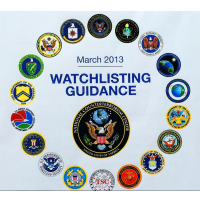Obama Administration Places People on Terrorist Watch List based on “Reasonable Suspicion”

The U.S. government can label any American a potential terrorist threat without having substantial evidence, relying instead on “reasonable suspicion” while making decisions that can ruin a person’s life.
Since the attacks of September 11, 2001, and the government’s development of the terrorist watch list system, federal officials have relied on secret guidelines to determine who to keep an eye on and prevent from flying on commercial planes.
But those guidelines—which have never been officially classified—were finally made public against the wishes of the Obama administration when the investigative news website The Intercept published them this week.
The “Watchlisting Guidance,” dated March 2013, revealed the government does not necessarily collect evidence before designating a U.S. citizen or foreign national a terrorist. As long as officials are just pretty sure a person is suspicious, an unsuspecting person can wind up on the watch list.
According to the guidelines: “In determining whether a REASONABLE SUSPICION exists, due weight should be given to the specific reasonable inferences that a NOMINATOR is entitled to draw from the facts in light of his/her experience and not on unfounded suspicions or hunches. Although irrefutable evidence or concrete facts are not necessary, to be reasonable, suspicion should be as clear and as fully developed as circumstances permit.”
That low standard of proof has alarmed civil libertarians, who also complained about the administration’s insistence on keeping the guidelines secret.
“Instead of a watch list limited to actual, known terrorists, the government has built a vast system based on the unproven and flawed premise that it can predict if a person will commit a terrorist act in the future,” Hina Shamsi, head of the American Civil Liberties Union’s National Security Project, told The Intercept. “On that dangerous theory, the government is secretly blacklisting people as suspected terrorists and giving them the impossible task of proving themselves innocent of a threat they haven’t carried out.” Shamsi, who reviewed the document, added, “These criteria should never have been kept secret.”
Being on the watch list can mean more than having trouble boarding a plane. It can make it more difficult to land a job and can mean someone is subjected to extra scrutiny during an encounter with police, such as a traffic stop.
Even former Federal Bureau of Investigation (FBI) agents handling counterterrorism cases have expressed concerns about the government’s approach to identifying would-be threats.
“If reasonable suspicion is the only standard you need to label somebody, then it’s a slippery slope we’re sliding down here, because then you can label anybody anything,” David Gomez, a former senior FBI special agent who once handled terrorism investigations, said. “Because you appear on a telephone list of somebody doesn’t make you a terrorist. That’s the kind of information that gets put in there.”
-Noel Brinkerhoff
To Learn More:
The Secret Government Rulebook For Labeling You a Terrorist (by Jeremy Scahill and Ryan Devereaux, The Intercept)
Over Government Objections, Rules on No-Fly List Are Made Public (by Charlie Savage, New York Times)
March 2013 Watchlisting Guidance (The Intercept)
Federal Judge Rules Secrecy of No-Fly List is Unconstitutional (by Noel Brinkerhoff, AllGov)
- Top Stories
- Unusual News
- Where is the Money Going?
- Controversies
- U.S. and the World
- Appointments and Resignations
- Latest News
- Trump Orders ICE and Border Patrol to Kill More Protestors
- Trump Renames National Football League National Trump League
- Trump to Stop Deportations If…
- Trump Denounces World Series
- What If China Invaded the United States?






Comments